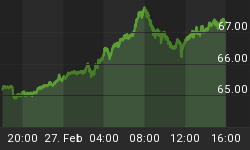It's fascinating to study and observe the distribution of wealth. History has shown great nations and companies that rose to the top from nothing and subsequently fell to nothing.
During the last phase of a boom, few save while most spend on credit. All the money spent flows to a few strong hands. Eventually banks (then private) stop lending, the public is bankrupt, and price deflation follows as people liquidate (so called K-winter). The few strong hands with money have no effect on prices since
a. They are very few in number, thus their consumption doesn't affect prices.
b. They believe their money is worth something, therefore they are in no hurry to spend until deflation is over and inflation picks up again.
This is what happened in the 1930's deflation/depression. Why were those strong hands (JPMorgans, Rockefellers etc) so few in number? First, there simply aren't many smart ones with the sole desire to make money; secondly, the contrarian group by definition is small in number. When everyone is bathed in good times, few can detect the winter is coming.
Those insiders reaped the benefits of deflation and came out even further ahead with their increased purchasing power. Such a theory is supported somewhat in reality as the world's wealth is concentrated in a few dozen hands. Over time, though, few rich manage to keep the wealth. When you have massive wealth (as a country, individual, or company), you attract the unscrupulous, and one careless mistake sinks your entire boat. There is the old Chinese saying-Wealth doesn't pass on 3 generations. Therefore, a fair amount of the concentrated wealth gets redistributed back to the ordinary people.
This is my view on how the world managed to get along reasonably well. 1930's is also what the K-winter / deflationists predict will happen again, as USA seemingly approaches the end of its boom.
This time, however, I believe we won't have K-winter. Refer to points a. and b. above and we see that
1. This time the strong hands aren't few in number. The strong hands with $trillions are in Asia-Just India and China constitute 40% of world population. You see, the Chinese and Indians didn't live under the same roof as the dollar-printing Americans. The general public this time aren't monogamous in spending attitudes and debt level. Asian debt levels aren't even close to their American counterpart.
Asia's share of population consumption will have big impact on prices. We never had such polarized, contrasting general public (one part broke, while the other part rich). Since the strong hands are larger in population size (2 billion vs 600 million in Europe and USA), I'd say inflationary forces are stronger than deflationary. Again, for price deflation to happen, most public must be broke, this just isn't the case today.
2. This time, the strong hands know their dollars are worth nothing. Because they didn't bathe in the golden times and debt bubble, they get to see things clearly. The US government never had such a strong hold in influencing money, banks, and with such corrupt morals-the US gov't doesn't care for the dollar's survival. Such arrogant and ignorant attitudes are demonstrated repeatedly with explicit action (deficits and market manipulation in unprecedented proportions) and statements (printing electronic dollars, helicopter money)
The take away is: K-winter proponents didn't take into account of:
1. The makeup of strong hands. The strong hands this time are large in population, whereas before the strong hands were the elite few.
2. A US government that has lost its time and place. Banks are no longer private, markets are no longer functioning, and few in power care to salvage what's left of the dollar, because they have other ways out (I mean with airplanes and internet access, there are plenty of nice places to live around the world than a bunker hole in Wyoming should things go wrong, right?)















